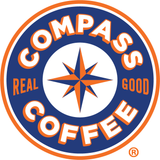Coffee and the American Revolution
Coffee is a fascinating beverage that has left its fingerprints across the globe and throughout much of recent human history; especially American history.
Prior to the American Revolution, coffee played second fiddle behind tea and was the second most popular caffeinated drink within the colonies; but it soon played an unexpected role in our nation's birth. In this blog post, we will delve into the intriguing history of coffee and explore how it became an indispensable part of the American Revolution.

"No taxation without representation!"
This phrase is one of the most famous in American lore, but many forget that this rallying cry started because the then-British Colonists were tired of being taxed on molasses, sugar, and tea (that other caffeinated drink).
Prior to the American Revolution, tea drinking was considered a fashionable and sophisticated social practice among the upper and middle classes. The colonies imported significant quantities of tea from British merchants, and it became an integral part of colonial culture (Pinkies Out!). However, the colonies did not maintain their cordial relationship with their favorite caffeinated beverage, due to something that many still oppose today – high taxes.
By 1773, the British Parliament passed the Tea Act, which granted the British East India Company a monopoly over the sale of tea within the colonies and allowed the British government to control the tax on tea. (A monarchy does not come cheap, people.)
As a result, on the night of December 16, 1773, the Sons of Liberty led a group of colonists aboard ships carrying around 46 tons of East India Trading Company tea and dumped the entire cargo into Boston’s Harbor. This act of protest became known as the 'Boston Tea Party,' and it was considered one of the colonists' first major protests against British taxation.
"Tea must be universally renounced, and I must be weaned, and the sooner the better.” - John Adams in a letter to his wife, Abigail, 1774.
The Boston Tea Party was not only a rebellious act against British taxation but against British tea as well. Soon after the Bostonian event, coffee consumption and its popularity skyrocketed across the Colonies, and coffee houses emerged as gathering places for political discussions and intellectual exchange (just like Compass Coffee’s cafes).
Eventually, coffee gained favor, popularity, and prominence, and was considered fashionable among those supporting the American Revolution, ultimately becoming a symbol of patriotism and defiance against the British.

“What a glorious morning for America!” – Samuel Adams, on hearing of the battle at Lexington, 1775.
As the Revolution escalated, coffee played a crucial role in sustaining the American troops. The Continental Army relied on the energizing effects of coffee to fight against the grueling conditions, including long marches, harsh weather, and limited supplies. A small cup of coffee would provide a quick burst of energy and keep troops going on the battlefield and help them stay alert and combat-ready.
General George Washington himself was known to be a fervent coffee drinker, and recognized that perhaps its greatest importance was off of the field of battle and within camp by maintaining troop morale. The simple act of soldiers sharing a cup of coffee while gathered around a campfire led to conversations about home, life, and why they were fighting in the war. Coffee breaks became a cherished time for social interaction, lifting the spirits of weary soldiers, and boosted morale in the face of adversity.
Additionally, the water available during the Revolutionary War was often unsanitary, leading to the spread of waterborne diseases. Coffee, when boiled, provided a safer alternative to drinking plain water, and its natural diuretic properties may have helped soldiers flush out toxins.
Clearly, coffee emerged as an indispensable companion for American Revolutionary soldiers, and beyond its nutritional and physiological benefits, it provided a sense of comfort, camaraderie, and symbolized the spirit of freedom.

“Coffee - the favorite drink of the civilized world.” - Thomas Jefferson, 1824.
Thomas Jefferson made this statement 33 years after the end of the American Revolution and 15 years after he finished his presidency. Suffice it to say, by 1824, America was its own country, and coffee’s popularity had only grown throughout the nation.
Coffee’s history, by luck or fate, seemed to grow in lock-step with America’s. It started as the once lesser alternative to Britain, became a revolutionary symbol, and brought people together during the toughest of circumstances.
So, on this 4th of July and all others, you can enjoy your morning coffee (we hope it's Real Good Coffee), knowing that its popularity began in the same coffeehouses where the revolutionary spirit of creating a nation with the ideals of life, liberty, and the pursuit of happiness was born.
(That… or people were just really, really, really tired of tea. And they hated taxes.)





